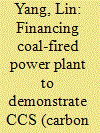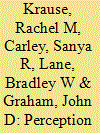| Srl | Item |
| 1 |
ID:
181433


|
|
|
|
|
| Summary/Abstract |
Traditional policy incentives for carbon capture and storage (CCS) mainly rely on fiscal subsidies, which tend to put an inordinate strain on public finances. This study attempts to explore a non-fiscal incentive policy, granting a time extension (extra electricity quota), to finance early CCS demonstration projects in China. We find that coal-fired power plant (CFPP) operate at a loss even without CCS retrofitting under the current electricity quota (4000 h per year), while it can make profits with CCS retrofitting if extra electricity quotas are provided. Specifically, the electricity quota needs to be roughly 4709–7260 h per year with the CO2 capture level ranging from 0.1 to 1 Mt per year in the demonstration stage. In particular, the levelized cost of electricity (LCOE) of CFPP with a capture level of 1 Mt per year is estimated at 298.8 CNY/MWh if the electricity quota reaches 7000 h per year, which is approximately equal to that of CFPP without CCS retrofitting and extra electricity quota (292.2 CNY/MWh). Thus, the extra electricity quota can be considered as an economically feasible policy incentive, and related results are able to provide useful information for electric power enterprises and government decision-makers.
|
|
|
|
|
|
|
|
|
|
|
|
|
|
|
|
| 2 |
ID:
126521


|
|
|
|
|
| Publication |
2013.
|
| Summary/Abstract |
This paper examines the extent of consumer knowledge about plug-in electric vehicles (PEVs) and the current policies in place to encourage their purchase and use. Data are collected via a survey administered to a sample of 2302 adult drivers in 21 of the largest cities in the United States. Almost two-thirds of the respondents provided incorrect answers to basic factual questions about PEVs and, of those, approximately 75% underestimated their private value or advantages. The vast majority (94.5%) of respondents were not aware of the current state and local incentives in place in their locale to encourage PEV purchase and use. Based on a review of consumer theory, multivariate models are developed and used to assess the factors associated with consumer interest in the two major types of PEV technologies, Battery Electric Vehicles (BEV) and Plug-in Hybrid Electric Vehicles (PHEV). Results show demographic and attitudinal characteristics having the largest influence on interest in either type of PEV. Misperceptions about purchase price and expected fuel and maintenance savings are likewise significant, although their impacts differ between BEVs and PHEVs. Better informing consumers about already available public incentives and advantageous aspects of existing PEV technologies offer promising steps toward their mass commercialization.
|
|
|
|
|
|
|
|
|
|
|
|
|
|
|
|